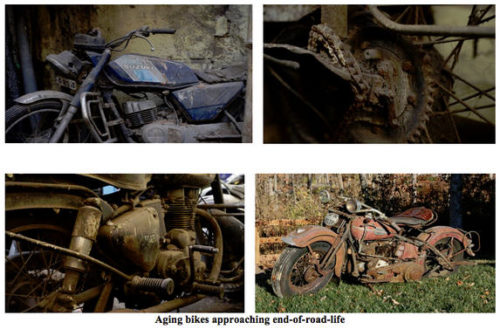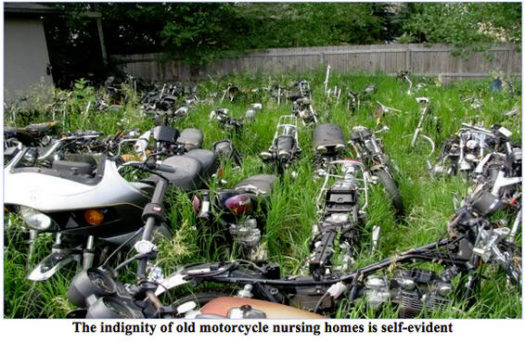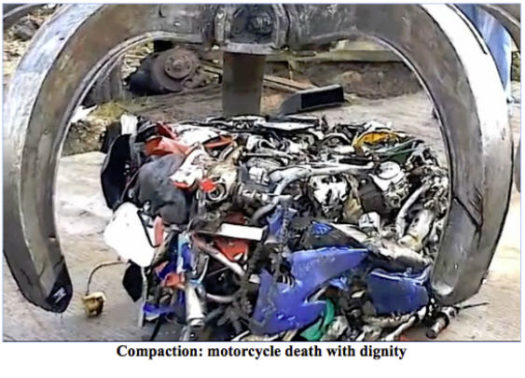Editor’s note: Many years after Steve’s decision to keep his Valkyrie he still has it along with a new Gold Wing. His devotion to this almost twenty year old family member prompted this loopy piece.
Advances in modern motorcycle technology mean that motorbikes are living longer than ever before. This raises important end-of-road-life issues, as it becomes increasingly difficult to provide leaded fuel and shelter for this hydraulically challenged, aging two-wheeler population. Qualified repair garages are full, and off-street parking is beyond the financial scope of most low and middle income biker families. It becomes a case of rust or bust.

Biker society members have long been reluctant to countenance the concept of actively ending the road-life of their beloved motorcycles, preferring to allow Nature to take its course. On the surface it seems simpler to let the natural phenomena of corrosion and obsolescence take their inevitable toll, until a head gasket blows and the piston rods seize up irrevocably.
But can we afford to allow pour elderly scooters to simply clank, wheeze, choke and sputter as American roads become increasingly over populated and earth’s atmosphere ever more polluted? These old bangtail scooters demand attention, as their paint peels and fades, engine crankcases suffer oily discharges, balding tires leave tread chunks at every stop sign, suspensions sag, and chrome corrodes. Is there an alternative for these ailing bikes and their gummed up carburetors?
The principles of vehicular rights dictate that the road should be shared equally among all bikes, regardless of color, cubic capacity or country or origin. All motorcycles have a right to ride on the traffic circles of life, even if this can be a dizzyingly circular argument. But other over-riding principles also warrant consideration. The life of a new motorcycle, fresh from the showroom floor, is one of great expectations, as riders with dreams of backroads spend endless hours buffing the exterior sheen and sniffing the new bike leather saddle smell.
As a motorcycle approaches the end of its natural road-life, however, its existence becomes much less pleasurable. Metal fatigue sets in. Every joint and ball bearing complains. The prospect looms of the motorbike spending its twilight years on blocks, its odometer inert, its flat battery becoming ever flatter, its plugs barely able to spark. It is now on a slippery slope towards the scrapheap. Even if it is decided that it is no longer suitable for roadside resuscitation, there is no certainty that the bike will do the right thing and develop terminal engine failure.
The biker virtues of loyalty and compassion do not permit many owners to trade their old rides in for new models. Moreover, these responsible owners cannot bring themselves to abandon their scooter on a secluded road in the dead of night: the moral principles of beneficence and motorcycle maintenance preclude such behavior, let alone the traceable vehicle identification number.
Further, it is not merciful in the least to leave the ancient two wheeled family member to rust in one of those sad roadside nursing homes for aging bikes. The quality of mercy is not strained, nor is their engine oil filtered. What sort of way is this to treat an elderly member of the extended family who provided thrilling road companionship for the biker during all those years? Such behavior contravenes the moral principle of junker justice.

Most riders and their mechanics are loathe to give these ailing creatures a lethal fuel injection, but there are alternatives. A quick and painless crush in the compactor at a modern scrapyard, and at least the old Harley could fulfill a useful function as a piece of yard art sculpture.
Motorcycles do not have an intrinsic right to road-life, yet there comes a time when we riders should cease ordinary and extraordinary means of support and accept that all motorcycles will eventually end up at the Pearly Gates. Premature compaction is ethically acceptable, if it is in the bike’s best interests to end its road-life, and if the bike is fully informed of the implications, and competent to consent to the process. The key moral principle is quality of road-life: the indignity of a noxious backfires, grating six speed tranny noises and a corroding frame, the so-called axle of evil, may outweigh the thrill of an occasional biker spin atop the old girl on local country roads.

In closing, let us assume that our elderly motorcycles wish to end their road-life with dignity. Providing they are fully aware of the significance of this decision, the principles of motorcycle-autonomy dictate that we riders should fulfill these final wishes by putting a timely and compassionate wrench in its works and running it at high speed without any oil in the crankcase, followed by a dignified compaction.
Copyright © 2017 From My Isle Seat
www.vicsocotra.com
